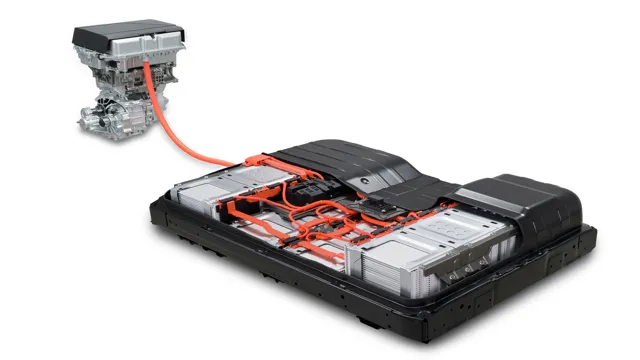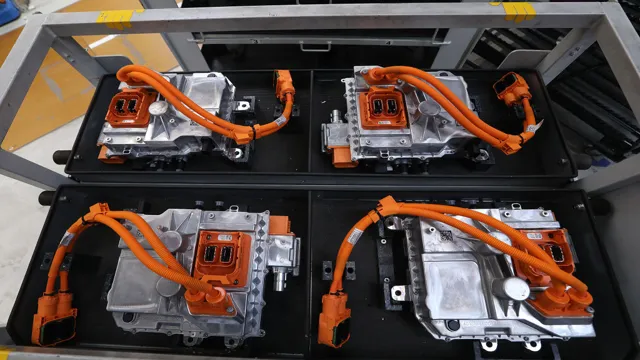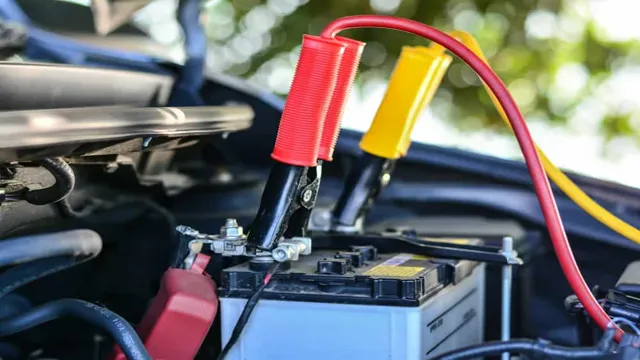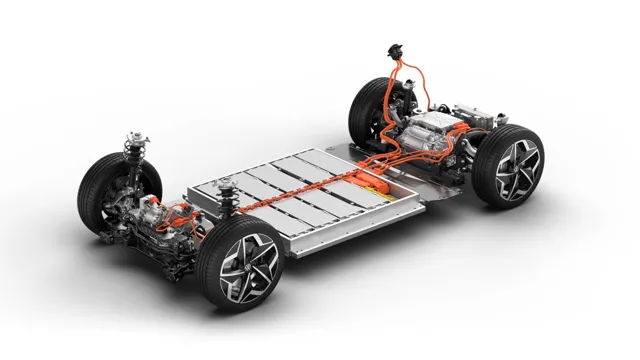Revolutionizing the Future: How Electric Car Batteries are Redefining Clean Energy and Reducing Emissions
Electric cars have been marketed as the eco-friendly solution for someone looking to reduce their carbon footprint. The trend towards electric cars has been promoted for years. However, some people are still concerned about the impact their electric car has on the environment.
It’s important to understand how electric car batteries work and the emissions they produce to make an informed decision about buying one. In this blog, we’ll dive into the lowdown on electric car battery emissions to give you a better understanding of what you’re driving.
What Are Electric Car Batteries Made Of?
When it comes to electric cars, the batteries are at the heart of their operations. They store the energy that powers the vehicle’s electric motor, making them an essential component. However, the production of electric car batteries does come with emissions, albeit at a lower rate compared to traditional vehicle emissions.
Batteries for electric cars are made of varying materials, including lithium-ion, nickel-cadmium, lead-acid, and nickel-metal hydride. Lithium-ion, in particular, is a popular choice due to its high energy density and ability to store a lot of energy in a relatively small space. While the production of electric car batteries does have emissions, it’s important to note that the resulting emissions are substantially lower compared to traditional gas-powered vehicles and that the overall environmental impact is significantly less.
The Materials Involved
Electric car batteries are primarily made up of three key components: the cathode, anode, and electrolyte. The cathode and anode are usually made of metal, such as nickel, cobalt, and manganese, while the electrolyte is commonly a liquid or gel-like substance containing lithium ions. These materials work together to create a chemical reaction that produces the electric charge needed to power the electric vehicle.
Additionally, the battery pack itself is often made up of hundreds or even thousands of smaller battery cells, which need to be carefully designed and manufactured to ensure proper functioning and durability over time. While electric car batteries can be costly to produce, advances in technology and increased demand have helped to bring down prices and make electric vehicles more accessible for everyday drivers. So, if you’re considering making the switch to an electric car, rest assured that the materials involved are well-suited for the task at hand and can provide reliable, efficient performance.

How These Materials Affect Emissions
When it comes to electric car batteries, they’re made up of different materials that can have varying effects on emissions. One of the most common materials used in electric car batteries is lithium-ion. This type of battery is popular due to its high energy density, long life, and reliability.
However, the extraction and production of lithium can have negative impacts on the environment. Mining processes can result in habitat destruction, water pollution, and greenhouse gas emissions. Cobalt is another material used in electric car batteries.
Cobalt is often associated with ethical concerns due to the exploitation of workers in the mining industry. While there are efforts underway to improve the sustainability of materials used in electric car batteries, it’s important to consider the impact of their production and disposal on the environment. Overall, using eco-friendly materials in electric car batteries can reduce emissions and help sustain the environment for future generations.
Do Electric Car Batteries Emit Harmful Substances?
There is a common misconception that electric car batteries emit harmful substances. However, this is not entirely true. Electric car batteries do contain chemicals that could pose a risk to the environment if not disposed of properly, but they do not release harmful emissions when in use.
In fact, electric cars emit significantly less greenhouse gases compared to traditional gasoline-powered vehicles. The main concern with electric car batteries is the disposal process, as improper disposal could lead to pollution and environmental damage. Therefore, it is crucial to recycle and properly dispose of these batteries.
In conclusion, while electric car batteries do contain chemicals that could be harmful to the environment, they do not emit harmful substances when in use. Proper disposal and recycling of these batteries is essential for the sustainability of electric transportation.
A Look at the Numbers and Research
Electric car batteries have become increasingly popular in recent years, as environmental concerns push people towards more sustainable transportation options. However, concerns have been raised about whether these batteries emit harmful substances. Research has shown that while electric car batteries do contain some toxic metals, such as lead, cadmium, and cobalt, they emit significantly less harmful substances than traditional gas-powered cars.
Additionally, many electric vehicles now use batteries made with safer materials, such as lithium-ion. Overall, the evidence suggests that electric car batteries are a relatively safe and sustainable technology, helping to reduce emissions and protect our planet.
Comparing Batteries to Gasoline Cars
One common concern about electric car batteries is whether they emit harmful substances. While it’s true that batteries do contain some toxic chemicals, such as lead and cadmium, they are encased in protective materials and designed to prevent exposure to these substances. In fact, one study found that electric cars emit 50% less harmful substances than gasoline cars, even when factoring in the production of their batteries.
Additionally, electric cars produce zero emissions while driving, making them much cleaner overall than their gasoline counterparts. It’s also worth noting that many battery manufacturers are constantly working to improve their production processes and materials to minimize any potential negative impacts. Ultimately, while electric car batteries may not be perfect, they are a significant improvement over traditional gasoline cars when it comes to emissions and environmental impact.
What Is Being Done to Reduce Electric Car Battery Emissions?
As electric cars become increasingly popular, it’s important to address the issue of electric car battery emissions. Fortunately, there are multiple measures in place to reduce this type of pollution. For starters, car manufacturers are investing heavily in research and development to improve the efficiency of batteries and minimize their environmental impact.
Additionally, many governments and private organizations offer financial incentives for the purchase of electric cars, which helps to increase demand and reduce emissions from traditional gas-powered vehicles. Finally, advancements in recycling technology have made it possible to recover more materials from used batteries, reducing the need to extract new materials and cutting down on pollution. These efforts are crucial for the long-term viability of electric cars and will help to protect our planet for future generations.
Efforts from Car Manufacturers
Car manufacturers are taking steps to reduce electric car battery emissions and make their vehicles more environmentally friendly. One effort being made is to create batteries with lower environmental impacts by sourcing materials from mines with better labor practices and reducing the use of toxic chemicals in the battery-making process. Additionally, some companies are exploring alternative battery chemistries that produce fewer greenhouse gas emissions.
Another approach is to increase the use of renewable energy to power the manufacturing process and charging stations for electric cars. And finally, some car manufacturers are offering battery recycling programs to reduce waste and recover valuable materials. These efforts demonstrate a commitment to sustainability and a desire to make electric cars a more viable option for consumers who prioritize eco-friendliness.
Government Policies and Incentives
One of the most significant concerns with electric cars is the emissions caused by their battery production and disposal. Fortunately, several government policies and incentives are being implemented to minimize these emissions. For starters, various initiatives aim to increase the use of renewable energy sources in battery production.
Additionally, many countries have launched programs that mandate the greener disposal of old batteries. Furthermore, some governments are offering tax breaks and subsidies to electric vehicle manufacturers that prioritize environmentally friendly battery production. These incentives encourage advancements in sustainable and low-emission battery tech.
As a result, we can expect that, in the future, electric vehicles will produce considerably fewer emissions throughout their life cycle.
The Future of Electric Car Battery Emissions
Electric car batteries are renowned for their low emissions and eco-friendly features, which is why more and more people are opting for electric cars as their primary mode of transportation. However, concerns about the emissions generated during the production of these batteries have arisen in recent times. The production of electric car batteries requires a lot of energy, and this energy often comes from non-renewable sources.
Additionally, the production process also generates emissions, such as CO2, which can negatively impact the environment. However, experts believe that the future of electric car batteries is promising. As technology advances, manufacturers are finding ways to reduce or even eliminate harmful by-products during battery production.
Furthermore, the advancement of renewable energy sources will enable battery manufacturers to use renewable energy sources to power their production processes. All in all, while electric car battery emissions may be a concern today, the future looks bright for the continued evolution of eco-friendly electric cars.
Advancements in Technology and Sustainable Materials
Electric car batteries have come a long way in recent years, and advancements in technology are making them more efficient and sustainable. One major concern with electric car batteries is their potential impact on the environment, with concerns around emissions during the manufacturing process. However, new sustainable materials and manufacturing techniques are being developed to mitigate these effects.
For instance, research is being conducted using recycled materials and bio-based materials for battery production, which reduces the carbon footprint and supports a circular economy. Additionally, advancements in battery management technology are helping to improve the durability and lifespan of batteries, further reducing their environmental impact. As we move towards the future of electric cars, it’s important to continue investing in sustainable materials and technology to ensure that the positive impact of electric vehicles is maximized.
Conclusion
Electric car batteries may not emit harmful pollutants or greenhouse gases while driving, but their production and disposal can have a major impact on the environment. So while electric cars may seem like the perfect “green” solution, it’s important to consider the entire life cycle of the vehicle from cradle to grave. Remember, a true electric car revolution will require not just greener cars, but also greener batteries.
“
FAQs
How do electric car batteries affect emissions?
Electric car batteries often have a lower environmental impact than traditional gas-powered cars because they produce fewer emissions during operation. However, the production of these batteries can contribute to emissions depending on the method used to extract the raw materials.
What is the lifespan of electric car batteries?
The lifespan of electric car batteries varies depending on several factors, such as the make and model of the vehicle and how often it is charged. Most electric car batteries are designed to last between 8-10 years, but this can vary based on usage and maintenance.
How do electric car batteries compare to traditional car batteries in terms of cost?
Electric car batteries are typically more expensive than traditional car batteries. The cost of replacing an electric car battery can range from $5,000-$15,000, whereas replacing a traditional car battery generally costs less than $200.
Can electric car batteries be recycled?
Yes, electric car batteries can be recycled. The recycling process can involve extracting the raw materials, such as lithium and cobalt, that make up the battery and repurposing them for new batteries or other products. This can help reduce waste and the environmental impact of battery production.





